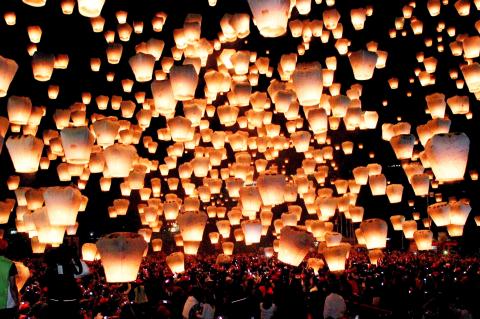The public has been invited to take part in an online vote hosted by the Tourism Bureau next month to select favorite tourist hotspots to be promoted domestically and internationally.
The bureau is dividing up tourist spots suggested by local governments into international, national, cross-county/city and local categories.
The events that are chosen as international events will be listed alongside the Taiwan Lantern Festival, Taiwan Foods Exhibition, Taiwan Cycling Festival, the Hot Spring and Foods Carnival, as well as other international events organized by national scenic areas and municipal governments on the bureau’s promotional calendar, the bureau said.

Photo courtesey of the Tourism Bureau
The determination of which event goes onto the calendar is two-tiered — one the online poll and one where the events will be judged by professionals.
The public’s votes will account for 20 percent of the final decision, while the experts and professionals’ vote will count for 80 percent, the bureau said.
According to the bureau, more than 20 counties have submitted their choices, totaling more than 45 events.
After deliberation by a team of panelists, 29 events have been selected for the final round.
They include the “Qiang Gu” (搶孤) — a folk competition that is part of the annual ghost festival — in Yilan’s Toucheng (頭城); the New Year count-down party in Taipei and the Sky Lantern Festival in New Taipei City’s (新北市) Pingsi (平溪).
Others include the International Matsu Cultural Tourism Festival in Greater Taichung, the Yenshui Beehive Fireworks Festival (鹽水蜂炮) in Greater Tainan and Hualien’s International Stone Sculpting Festival.
Yilan County, New Taipei City, Hsinchu County, Greater Tainan, Greater Kaohsiung and Pingtung County each have two events entering the final round.
Scenic hotspots from Chiayi and Lienchang counties were missing from the list.
However, the bureau said the two counties are home to the Alishan (阿里山) and Matsu national scenic areas respectively, which are already nominated by the bureau for international events, so there was no need to list more.

The Coast Guard Administration (CGA) and Chunghwa Telecom yesterday confirmed that an international undersea cable near Keelung Harbor had been cut by a Chinese ship, the Shunxin-39, a freighter registered in Cameroon. Chunghwa Telecom said the cable had its own backup equipment, and the incident would not affect telecommunications within Taiwan. The CGA said it dispatched a ship under its first fleet after receiving word of the incident and located the Shunxin-39 7 nautical miles (13km) north of Yehliu (野柳) at about 4:40pm on Friday. The CGA demanded that the Shunxin-39 return to seas closer to Keelung Harbor for investigation over the

National Kaohsiung University of Science and Technology (NKUST) yesterday promised it would increase oversight of use of Chinese in course materials, following a social media outcry over instances of simplified Chinese characters being used, including in a final exam. People on Threads wrote that simplified Chinese characters were used on a final exam and in a textbook for a translation course at the university, while the business card of a professor bore the words: “Taiwan Province, China.” Photographs of the exam, the textbook and the business card were posted with the comments. NKUST said that other members of the faculty did not see

An apartment building in New Taipei City’s Sanchong District (三重) collapsed last night after a nearby construction project earlier in the day allegedly caused it to tilt. Shortly after work began at 9am on an ongoing excavation of a construction site on Liuzhang Street (六張街), two neighboring apartment buildings tilted and cracked, leading to exterior tiles peeling off, city officials said. The fire department then dispatched personnel to help evacuate 22 residents from nine households. After the incident, the city government first filled the building at No. 190, which appeared to be more badly affected, with water to stabilize the

The Taipei City Government yesterday said contractors organizing its New Year’s Eve celebrations would be held responsible after a jumbo screen played a Beijing-ran television channel near the event’s end. An image showing China Central Television (CCTV) Channel 3 being displayed was posted on the social media platform Threads, sparking an outcry on the Internet over Beijing’s alleged political infiltration of the municipal government. A Taipei Department of Information and Tourism spokesman said event workers had made a “grave mistake” and that the Television Broadcasts Satellite (TVBS) group had the contract to operate the screens. The city would apply contractual penalties on TVBS